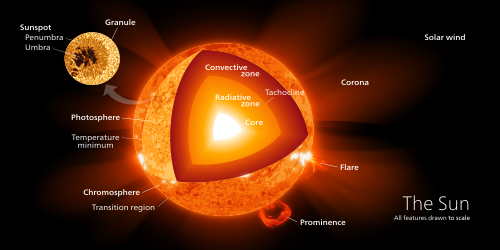The Sun is the star at the center of the Solar System. It is a nearly perfect sphere of hot plasma, heated to incandescence by nuclear-fusion reactions in its core, radiating the energy mainly as visible light and infrared radiation. It is by far the most important source of energy for life on Earth. Its diameter is about 1.39 million kilometres (860,000 mi), or 109 times that of Earth. Its mass is about 330,000 times that of Earth, and accounts for about 99.86 percent of the total mass of the Solar System. Roughly three-quarters of the Sun's mass consists of hydrogen; the rest is mostly helium, with much smaller quantities of heavier elements, including oxygen, carbon, neon, and iron. This diagram illustrates the general structure of the Sun, with all features drawn to scale.Diagram credit: Kelvin Ma
| This picture of the day has been featured on Portal:Solar System. |
